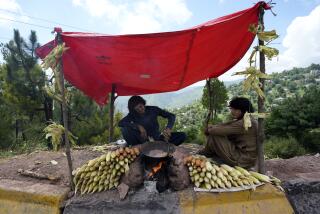IMF Panel OKs 50% More for Loans to Europe, 3rd World
- Share via
WASHINGTON — A 50% increase in money available for loans to Eastern Europe and developing countries was approved today by the International Monetary Fund’s policy-making committee.
At the insistence of the United States, the IMF’s Interim Committee linked the $60-billion increase to a plan to force substantial economic reforms from 11 poor countries, which are $4 billion behind on their loan payments.
U.S. officials said Congress had demanded the link before approving the increase in the U.S. contribution, or quota.
In exchange for the link, which many debtor countries opposed, the United States agreed to begin consideration of an additional increase in its contribution in 1993, two years earlier than originally planned.
“Despite reservations that a number of members had on certain individual elements of the package, we recognize this was a consensus. . . . Everybody had to give in order to achieve a compromise,” said Canadian Finance Minister Michael H. Wilson, chairman of the 22-member Interim Committee.
The quota change, which must be approved before the end of 1991 by nations representing 85% of the fund’s voting power, will raise the fund’s resources to $180 billion from $120 billion.
“What you see . . . is a package with features that are designed to strengthen the role of the International Monetary Fund as the central pillar of the international financial system,” Wilson said.
Delinquent countries that agree to adopt economic reforms would be eligible for money from a special IMF fund. However, nations in arrears could lose their voting rights. Also, the agency could sell 3 million ounces of gold, roughly equivalent to the members’ original contributions, to meet the obligations of defaulting debtors.
The 11 nations in arrears are the Sudan, Zambia, Peru, Costa Rica, Honduras, Guyana, Somalia, Sierra Leone, Cambodia, Vietnam and Panama.
The Interim Committee also agreed to reorder the voting power within the fund, allowing Japan to vault from fifth place to second, behind the United States, in recognition of its growing financial power. West Germany will share the second position.
Officials said Britain, which had been No. 2, and France were close to an agreement to share the fourth spot, although that was not addressed in the Interim Committee’s statement.
The panel reached agreement on the package Monday night after debating it most of the day in private sessions. It announced the pact in a communique this morning.
The plan had received an important boost Sunday with the endorsement by the Group of Seven major industrial nations: the United States, Japan, West Germany, Great Britain, France, Canada and Italy.
On other subjects, the Interim Committee promised to support reforms in Eastern European countries emerging from four decades of communism but not at the expense of developing countries. It welcomed applications for fund membership from Czechoslovakia and Bulgaria. Poland, Hungary, Yugoslavia and Romania are already members.
The panel also pointed to progress under Treasury Secretary Nicholas F. Brady’s 14-month-old program to reduce the crushing $1.3-trillion debt burden on Third World countries.
More to Read
Sign up for Essential California
The most important California stories and recommendations in your inbox every morning.
You may occasionally receive promotional content from the Los Angeles Times.













